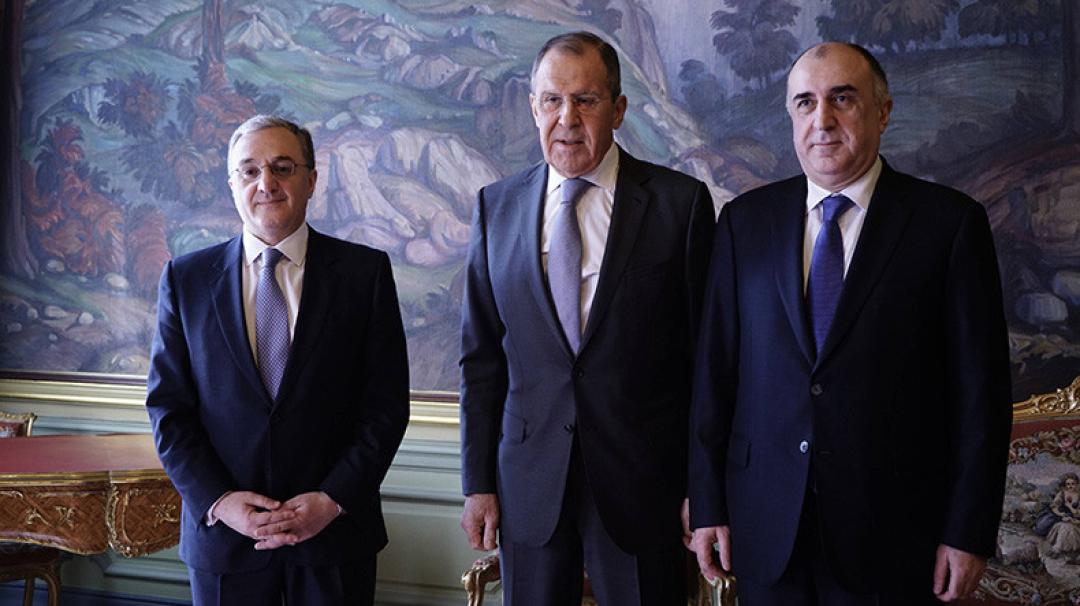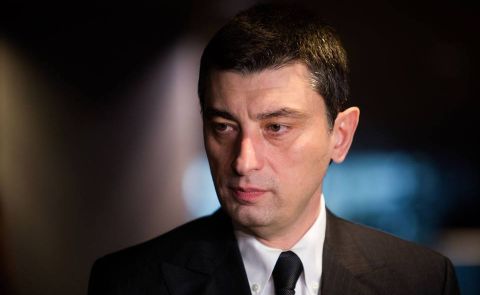
Mnatsakanyan and Mammadyarov issue joint statement on Nagorno-Karabakh

On 21 April, the Foreign Ministers of Armenia, Zohrab Mnatsakanyan, and Azerbaijan, Elmar Mammadyarov, held a joint video conference with the OSCE Minsk Group co-chairs and discussed the next steps in the settlement process of the Nagorno-Karabakh conflict between the two countries.
“Considering the great challenges now confronting all populations without regard to political boundaries … the Foreign Ministers and the Co-Chairs [of the OSCE Minsk Group] expressed the hope that the resolve seen in the global pandemic response will bring a creative and constructive impetus to the peace process,” read the joint statement issued by the group.
“The Foreign Ministers and Co-Chairs agreed to remain in close contact and to continue negotiations in person as soon as possible,” it further said. The statement also said that the worldwide spread of the virus has delayed not only such talks but also confidence-building “humanitarian measures” previously agreed by the conflicting parties. “Nevertheless, the necessary work to prepare these activities continues,” it stressed. The Co-Chairs also drew attention to the 23 March appeal by the Secretary General of the United Nations for global ceasefire measures during the current health crisis.
The Azerbaijani Foreign Ministry said in a statement published in its official website after the meeting that “Azerbaijan’s position on the settlement of the Armenia-Azerbaijan Nagorno-Karabakh conflict remains unchanged. It is based on the norms and principles of international law, as enshrined in the UN Charter and OSCE Helsinki Final Act and the implementation of the related UN Security Council resolutions.” “Azerbaijan [insists] that substantive talks must be intensified as there is no way to move out from the situation [the] region is [currently facing]. The OSCE Minsk Group Co-Chairs are considering the opportunities to move [the peace process] forward… without military consequences,” the ministry’s report read.
The last meeting of Armenia’s and Azerbaijan’s Foreign Ministers was held between 28-30 January in Geneva with the mediation of the OSCE Minsk Group co-chairs. It was noted that this was one of the most intensive meetings between the foreign ministers of the two countries in recent years. According to the official information, the following topics were discussed: implementation of agreements and proposals discussed in 2019 and possible next steps to prepare the populations for peace; principles and elements forming the basis of a future settlement; and timing and agenda for advancing the settlement process (Caucasus Watch reported).
Lavrov’s comments on the issue and Mnatsakanyan’s response
Prior to the video conference, the Russian Foreign Minister Sergey Lavrov said that there is currently a document on the table that provides a step-by-step solution to the Nagorno-Karabakh conflict. He firstly spoke on the successes of the UN resolutions in regard to the conflict. “The adopted resolutions are public documents approved amid hostilities and assumed, first of all, a complete cessation of hostilities and a transition to negotiations. They confirmed the territorial integrity of the Republic of Azerbaijan. However, they also urged stopping the war and moving on to negotiations. Since then, negotiations have begun, and more than once. The format of the Baku-Yerevan talks, the Troika of OSCE Minsk Group co-chairs, and the personal representative of the OSCE Chairman-in-Office have already been established. This format is effective and functional, which embodies the UN Security Council’s demand to stop the war and start negotiating,” he said.
He then recalled the Madrid agreements, documents prepared by the Russian side in 2010-11, the so-called Kazan principles, and projects distributed a year ago in Moscow at a meeting of the Foreign Ministers of Armenia, Azerbaijan, and Russia with the participation of the co-chairs, that are still on the agenda. “These documents suggest moving towards a settlement based on a step-by-step approach, assuming at the first stage the solution of the most pressing problems, the liberation of several areas around Nagorno-Karabakh and the unblocking of transport, economic, and other communications. So, I believe that when we decide to sign these documents, it will be the first step in implementing the UN Security Council resolutions that demanded to stop the war and start negotiating. Now we need to agree, and this is exactly what we seek as co-chairs of the OSCE Minsk Group,” he emphasized.
Mnatsakanyan replied to the statements made by Lavrov by stating that the peaceful settlement of the Karabakh conflict is possible only through mutual concessions with a clear definition of status and security measures. “The Armenian side will never make unilateral concessions. Such a move may imply a violation of security principles, a threat to the people of Karabakh, especially since these threats continue to be real and existential,” Mnatsakanyan said.
He emphasized that for the Armenian side, the right to self-determination, which can be achieved as a result of a peaceful negotiation process, is more than a priority principle. Regarding the issue of handing some areas around Nagorno-Karabakh to Azerbaijan, Mnatsakanyan emphasized that they are, first of all, a security zone and a line of defense. “In no way can the Armenian side even suggest a revision of this position, thereby jeopardizing the security of the people of Karabakh,” he emphasized.
The Head of European Integration NGO Karen Bekaryan wrote on his Facebook page that Mnatsakanyan needs to resign following Lavrov’s comments. “If the statement by the Russian foreign minister doesn’t correspond to reality, this is simply an indicator of complete failure of the relations between Armenia and the Russian Federation. If the statement by the Russian foreign minister corresponds to reality, we are dealing with overturn of the national and state interests of Armenia and Nagorno-Karabakh. In both cases, the Armenian foreign minister must resign or be dismissed from office. If the foreign minister doesn’t resign or isn’t dismissed, this will mean that the Prime Minister is directly responsible for all this, along with all the consequences arising from this,” the post read.
The Head of Azerbaijan's Presidential Administration’s foreign policy department Hikmet Hajiyev also reacted negatively to Mnatsakanyan’s comments. “The Armenian Foreign Minister’s statement nullifies the negotiation process to resolve the conflict under the auspices of the OSCE Minsk Group. Such destructive statements from Yerevan inflict a serious blow on the negotiation process and violate the negotiations. This is also a manifestation of disrespect for the co-chairs”, he said. “If Armenia wants to get out of the negotiation process with such statements, then it must openly recognize its position. Co-chairs of the OSCE Minsk Group, in turn, must respond to Armenia’s statement,” he added.
Drone incident on the contact line
On the same day as the Foreign Ministers’ meeting took place, the Armenian-backed Nagorno-Karabakh Defense Army claimed to have shot down an Azerbaijani military drone on the contact line, reported the Armenian Radio Free Europe.
In a statement, the Defense Army said the Israeli-made drone was hit by one of its air-defense units early in the afternoon immediately after entering its airspace over a southern section of the Armenian-Azerbaijani “line of contact” around Karabakh. It promised to release photographs of the wreckage of the unmanned aerial vehicle (UAV) “later on.”
The statement also said that Azerbaijani warplanes, combat helicopters and UAVs have carried out more frequent flights near the heavily fortified frontline as of late. It claimed that Azerbaijani drones have also repeatedly attempted to cross into Armenian-controlled territory “for intelligence-gathering purposes” and urged Baku to avoid such “provocative steps.” The Azerbaijani Defense Ministry denied that its drone was shot down.
See Also


Russia Begins 24/7 Radiation Monitoring in Dagestan After Iranian Nuclear Incident

How Do Caucasus States React to Israel-Iran War?

Weekly Brief on Military Situation in the South Caucasus (9–15 June 2025)

Former Georgian PM Gakharia to Face Prosecution

